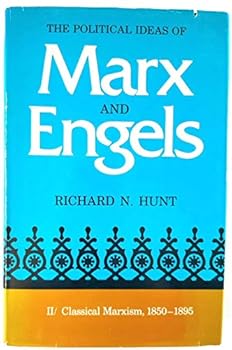The Political Ideas of Marx and Engels: Volume II: Classical Marxism, 1850–1895 (Political Ideas of Marx and Engels, 2)
Richard N. Hunt has examined the entire body of writings by Marx and Engels, including little-known essays and letters, to present a lucid chrono-logical analysis of the development of their political ideas. Volume 1, Marx-ism and Totalitarian Democracy, 1818-1850, called "gracefully writ-ten, massively researched, and gener-ally magnificent" (Thomas Ferguson, Slavic Review), was widely acclaimed volume, Professor Hunt covers the period 1850-1895, whose central political events were the Franco-Prussian War and the short-lived Paris Commune. He continues to document with meticulous scholarship his thesis that throughout their lives Marx and Engels were committed to classic democratic ideals and did not advocate minority revolution, dic-tatorship by an elite, or the establishment of a totalitarian regime.
In volume 1, Professor Hunt dis-tilled from the Marx-Engels corpus two general strategies for achieving communism. He now finds two more, one based on the study of conditions in Russia undertaken by the two men in the 1870s, and another that developed after they observed the expansion of democratic institutions, especially in England.
Although the twentieth century regards Marx and Engels as the apostles of violent revolution, Pro-fessor Hunt finds that the most truly radical element in their political thought was their vision of a post-revolutionary society that would transcend the division of labor, becoming a society of occupational fluidity, one with-out professional politicians, bureaucrats, or legislators.
In volume 1, Professor Hunt dis-tilled from the Marx-Engels corpus two general strategies for achieving communism. He now finds two more, one based on the study of conditions in Russia undertaken by the two men in the 1870s, and another that developed after they observed the expansion of democratic institutions, especially in England.
Although the twentieth century regards Marx and Engels as the apostles of violent revolution, Pro-fessor Hunt finds that the most truly radical element in their political thought was their vision of a post-revolutionary society that would transcend the division of labor, becoming a society of occupational fluidity, one with-out professional politicians, bureaucrats, or legislators.
Format:Hardcover
Language:English
ISBN:0822934965
ISBN13:9780822934967
Release Date:January 1984
Publisher:University of Pittsburgh Press
Length:432 Pages
Weight:1.70 lbs.
Dimensions:9.5" x 1.3" x 6.3"
Customer Reviews
0 rating





